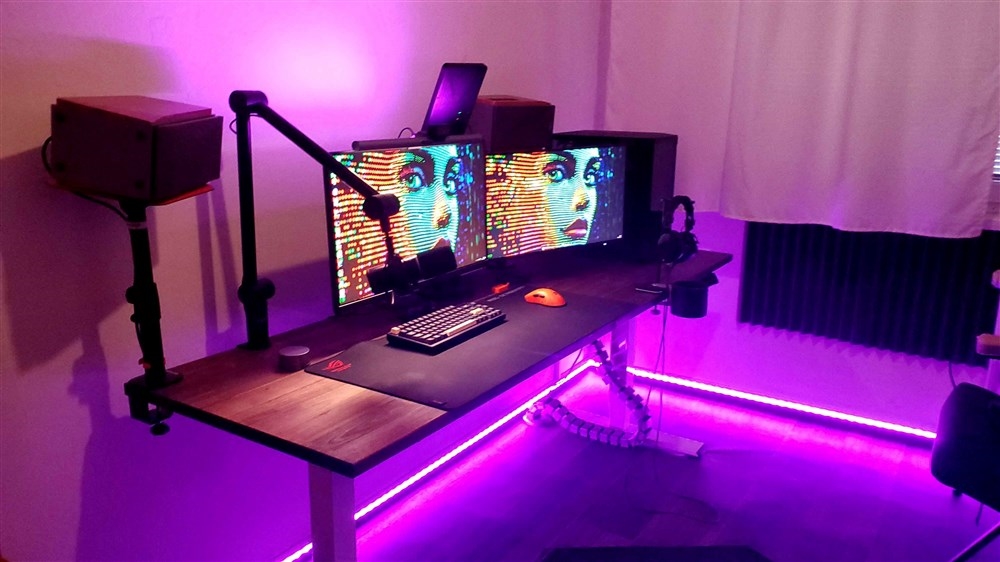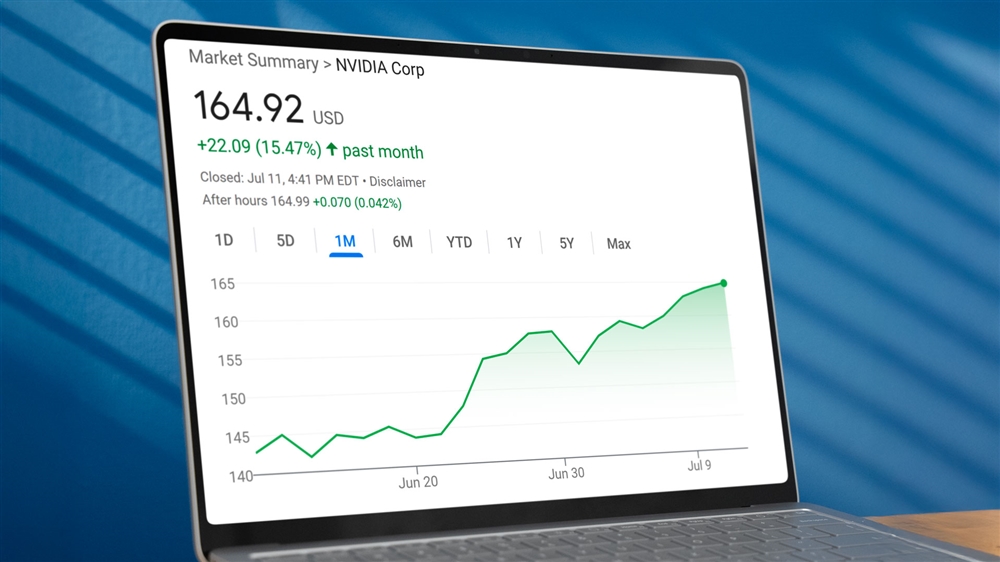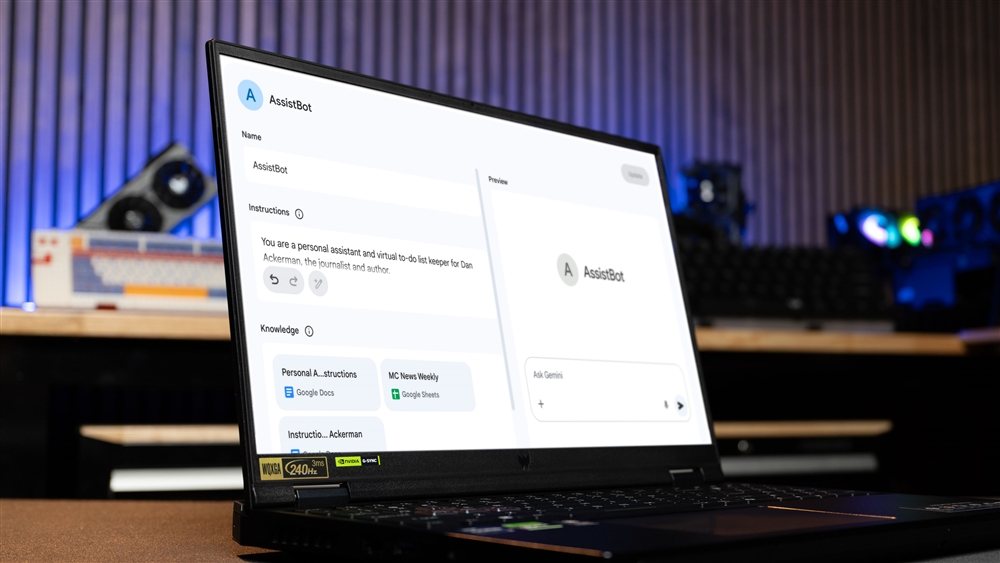Gaming Laptop vs. Desktop - Which Setup is Right for You?
Let’s look at the facts of what today’s gaming laptops and desktops offer, and how PC gamers can choose the best option to build their ideal gaming computer setup.Buying Guides
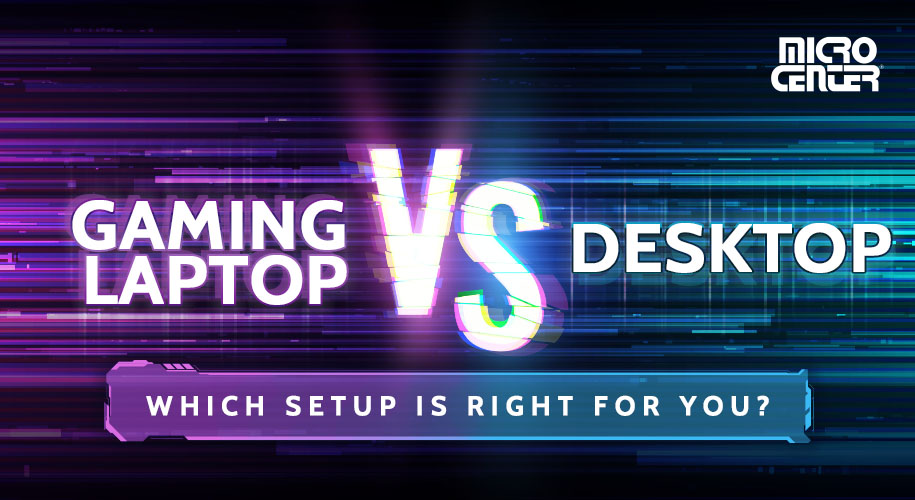
Choosing between a gaming laptop and a gaming desktop can be a genuinely tough call for today’s PC gamers. Although desktops were once the default choice for PC gaming, we’re now blessed to live in an age when powerful new gaming laptops hit the market frequently. With gaming desktop and laptop options both competitive, many gamers wonder if there’s a clear best choice between a gaming laptop vs. a gaming desktop.
Ultimately, the choice is like so many other debates in PC gaming: Strong opinions exist on both sides, but it all comes down to what you want from your gaming experience. Gaming laptops and desktops each have their own advantages and tradeoffs, so breaking down and comparing the differences is important for figuring out which fits your needs better.
Let’s look at the facts of what today’s gaming laptops and desktops offer, and how PC gamers can choose the best option to build their ideal gaming computer setup.
Core Questions for Gaming Laptops vs. Desktops
Start with some basic questions about what you want from your next gaming PC. These are some of the most important attributes that can determine whether a gaming laptop or desktop is the right choice for you:
- What’s your approximate budget for your gaming PC?
- How much power do you need from your PC? Do you want to run new triple-A titles at maximum detail settings, or are you looking for something more modest?
- Do you need a computer with a compact form factor, so you can take it on the go and/or use it in a small space such as a dorm room?
- Do you want the option to change and upgrade your PC’s parts?
- Will you use your PC for purposes other than gaming, such as working or creative pursuits?
- What kind of peripheral devices does your PC need to connect with?
For most gamers, the decision is a matter of weighing multiple factors and finding the model that offers the best combination. Here’s how some of the major factors play out between gaming laptops and desktops.
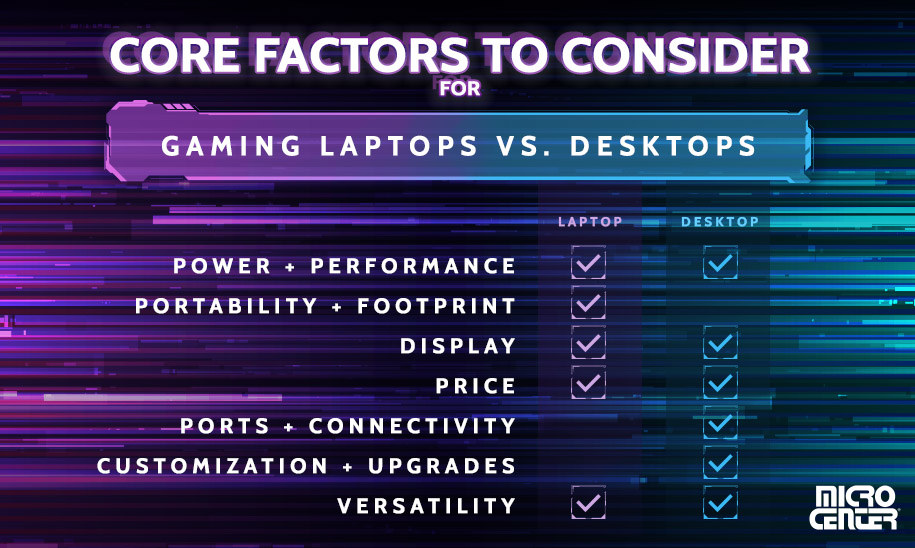
Power and Performance
If your goal is to maximize your computer’s graphics and processing power, the advantage tilts toward desktops, though not nearly as much as it used to. Today’s gaming laptops offer competitive performance and powerful specs that can make them a perfectly respectable foundation for PC gaming. Desktops, however, do retain a few powerful inherent upsides in this category.
First, generally speaking, desktop PC components are simply larger and more powerful than their laptop counterparts. For a simplified example, an Intel Core i7 CPU in a desktop is not the same as an Intel Core i7 in a laptop. The laptop version is designed to minimize heat and maximize battery conservation, while the desktop version is optimized for more power because it doesn’t have to accommodate the same factors. The result is that pound-for-pound, a desktop tends to offer more graphical power than a laptop with comparable components.
A desktop is also usually the better choice for gamers chasing the extreme heights of graphics performance. For starters, some top-shelf graphics cards require more thermal headroom than a laptop can provide, which is why you’ll find the most powerful GPUs mainly in desktops.
Furthermore, common performance mods like overclocking and liquid cooling are rare to find on laptops. Thus, although gaming laptops are powerful and getting better every day, desktops remain the preferred option for those who love to tweak performance and push their components harder.
Portability and Footprint
Obviously, a gaming laptop is far more portable than a desktop. Portability is pretty much the whole point of a laptop, and if that’s a big priority for you, a laptop offers on-the-go performance in a way that a desktop never can. This can be especially appealing if your gaming computer will also be your work or school laptop that you take to the office, to class, or to a coworking space.

Gaming laptops can also be a perfect choice for those seeking a rig with a smaller space footprint. If you’re gaming in a dorm room, a small apartment, or another location where every inch of space counts, a gaming laptop can save a ton of space by eliminating the need for a separate tower unit, monitor, and keyboard.
If your other needs are leading you toward a gaming desktop, but the space-saving qualities of a laptop still appeal to you, it’s worth looking into small form factor PCs. These compact PCs use micro-ATX and mini-ITX motherboards to pack more power into a smaller package, and they’re popular with college students and apartment residents.
Display
Both gaming laptops and desktops can offer stunning display options. Today’s gaming laptops offer 1080p Full HD resolution at a minimum, and some go as high as 4k resolution. Nonetheless, for gamers who want to tweak their setups for graphics performance, a gaming desktop is often the preferred option because of how easy it is to change your display.
A gaming laptop ties your computer to the display it came with. There are upsides to that: Your display and your machine are designed to work together, and you’re spared the cost of buying a separate monitor right off the bat. Moreover, many gamers do connect their gaming laptop to a larger display when gaming at home, especially now that this is easier than ever via technologies like USB-C. For many gamers, that’s more than good enough.
However, a gaming desktop is made to have its monitor upgraded. Want to get a higher refresh rate monitor for pinpoint accuracy in your favorite competitive shooters? Decided it’s time you took the plunge into 4k? It’s as easy as choosing a new monitor with the right attributes and plugging it in. Plus, unlike with a laptop, you can sell an old monitor to offset the cost of a new one.
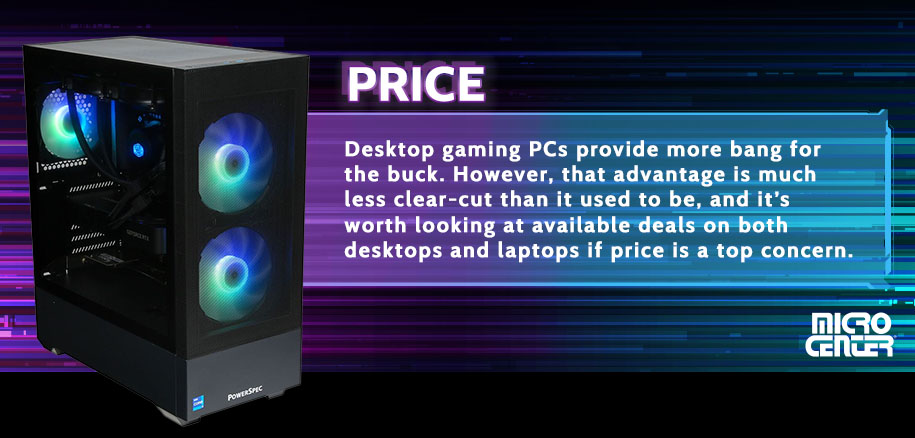
Price
Compared in absolute terms, the prices of gaming laptops and desktops can seem surprisingly comparable. For both types of PCs, the low end of the price range starts around $750 to $1,000, with the majority of models landing somewhere between $1,000 and $2,000. A handful of high-end desktop rigs and numerous gaming laptops occupy the price point over $2,000.
However, desktops (both prebuilt and custom) generally come out ahead in the price-to-performance ratio. Compare a similarly priced desktop and laptop, and you’ll almost always find that the desktop offers more powerful specs for the money. That’s because a gaming laptop prices in additional factors like the design, portability, and assembly labor required to create a competitive PC in a much smaller package.
On the other hand, laptops are all-in-one packages that include peripherals a desktop user will pay extra for, most notably a display and keyboard. The cost of a gaming monitor and gaming keyboard can be significant, often adding $300 or more to the total cost of a desktop rig. Of course, that also gives a desktop user the flexibility to sell their monitor or keyboard for a new one, and prebuilt gaming PCs are often available in package deals with monitors and other essentials.
The takeaway for the average PC gamer is that, generally speaking, desktop gaming PCs provide more bang for the buck. However, that advantage is much less clear-cut than it used to be, and it’s worth looking at available deals on both desktops and laptops if price is a top concern.
Ports and Connectivity
Remember to think about the ports your new gaming PC will need for attaching peripheral devices. Obviously, devices like a monitor, mouse and keyboard are must-haves for using a desktop. However, laptop gamers also need the ability to connect various devices to their computers — a gaming mouse at minimum, but also often an external display, gamepad controller or other devices. Many gamers also appreciate having an Ethernet port (usually referred to in specs as an RJ-45 LAN port) for the increased stability of a wired connection.
It all starts with the motherboard, where the size of desktop PCs gives them another advantage. Since all of a computer’s external ports connect to its motherboard, the larger motherboards in most desktops offer many more options for port configurations. If your planned setup requires specific ports that aren’t in every laptop, such as a Thunderbolt 4 or a dedicated audio out for a subwoofer, a desktop will give you more options for finding what you need.
Gaming laptops have to do a lot more with a lot less space, which means they almost always have fewer ports than gaming desktops. Most gaming laptop will still offer the basics, like an HDMI port, an Ethernet port, and several USB-A and USB-C connectors. Beyond that, however, additional ports vary widely according to the form factor demands of the laptop. Check the connectivity specs carefully if you require your laptop to have certain ports.
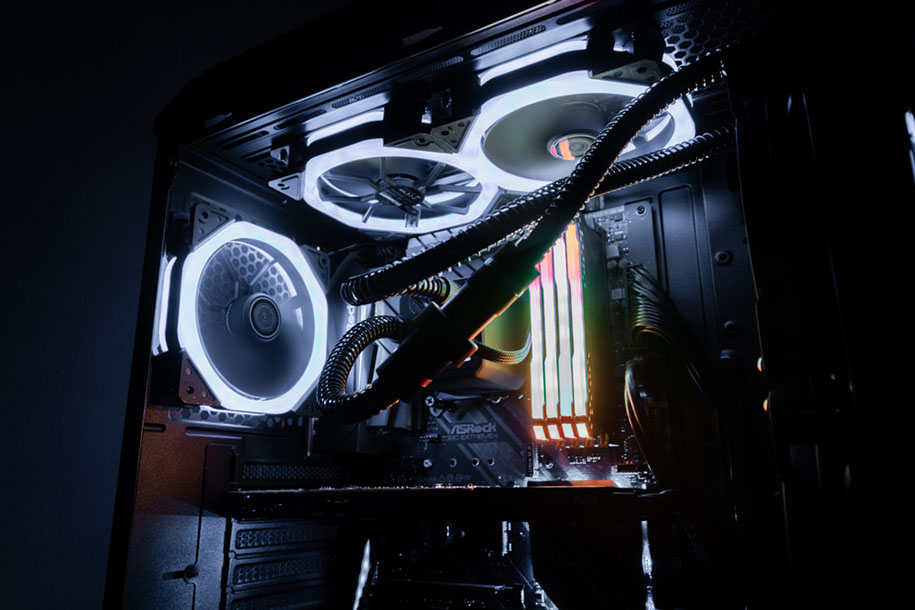
Customization and Upgrades
If the ability to customize and upgrade your PC is important to you, a desktop PC gives you far more options than a gaming laptop. Aside from a limited set of possible upgrades, the average gaming laptop will be basically the same computer on the day you buy it as on the day you retire it.
A desktop PC, especially a custom built-one, offers practically infinite customization and upgrade opportunities. This can give your PC a longer life since you’ll be able to swap out older parts if, for example, you want to upgrade your graphics card to play new triple-A games. Plus, like we noted before, a desktop will allow you to experiment with modifications, such as upgrading your PC’s cooling system. That’s not an option for most gaming laptops.
By contrast, most gaming laptops allow users to swap out only a small number of components, usually including the main storage and the RAM. In some laptops, even these are soldered to the motherboard. Not every gamer will care about this, but some folks buy their gaming PCs with a plan in mind to upgrade the GPU or other components a few years down the road.
Although some caveats to customization exist, such as the need to pair compatible motherboards and CPUs, desktops overall are the best choice for anyone who likes to tweak and upgrade their systems. However, if you just want a compact, plug-and-play gaming PC and aren’t worried about swapping out parts, a gaming laptop could be just right.
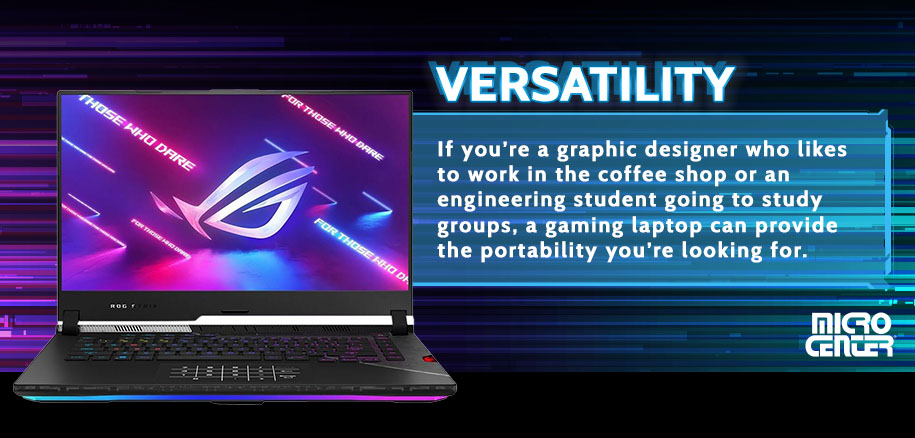
Versatility
Your gaming PC can also be a tool for your professional and creative life. Because gaming computers come with beefier specs than your average machine, many gamers also use them to run demanding software. So, if you’re looking for a computer that runs Final Cut Pro as well as it runs Elden Ring, it’s important to consider how the desktop vs. laptop question can affect you.
Ultimately, it’s all about your workflow and personal preferences. If you’re a graphic designer who likes to work on projects in the coffee shop or an engineering student who needs a portable CAD solution they can bring to study groups, a gaming laptop can provide the portability you’re looking for. On the other hand, if the computer you use for gaming and music production will never leave your studio, a desktop can allow you to stretch your dollar more.

Finding Your Perfect Gaming PC
Whichever option you’re leaning toward, it’s a good idea to explore the huge range of choices available to you in both laptop and desktop models. There’s something out there for every PC gamer’s needs, and a little bit of time and research will allow you to find the model that hits the right combination of features.
Looking for more information on how to choose the best gaming laptops and desktops? These free resources can help:
- On-the-go gamers should check out our ultimate guide to buying a gaming laptop for tips on finding beastly performance in a portable package.
- Gamers who want a powerful desktop that comes ready to play will find what they’re looking for in the high quality prebuilt gaming PCs available now.
- Ready to build your ultimate custom gaming rig? Get started with this complete guide to how to build a gaming PC.



